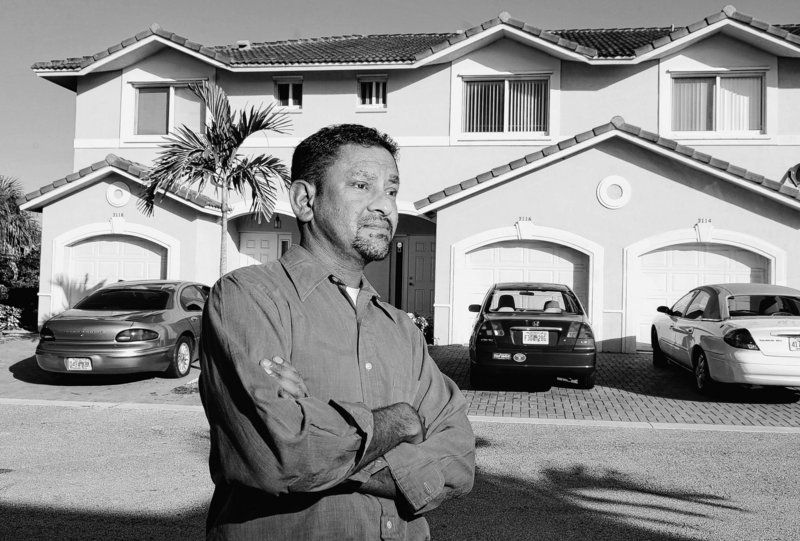FORT LAUDERDALE, Fla. – The epic housing collapse has turned thousands of homeowners into reluctant landlords.
They’re learning the hard way about how rentals work. They’d much prefer to sell, but they can’t get the price they want or need. In many cases the homeowners are “under water,” owing far more than the properties are worth.
Reluctant landlords at least have a red-hot rental market going for them. Some have taken jobs elsewhere and collect rent from afar. But even those who have stayed in town face the typical headaches: dealing with problem tenants, paying for repairs and losing money each month.
“I never wanted to be a landlord and play the renting game because it’s too much of a hassle,” said Mike Ablack, 34, of Coconut Creek, Fla. Yet Ablack is doing just that, caught in the crosshairs of the housing bust.
In 2005, at the height of the housing boom, he bought a three-bedroom Coral Springs, Fla., townhouse for $199,900. He put 20 percent down, but he lost all of that equity later in the massive price declines that spread throughout South Florida.
Eventually he wanted to buy a bigger place, but selling the townhouse was out of the question because he was under water. He says he owes about $140,000 on the mortgage while units in his complex are worth only about $75,000.
He didn’t have the necessary cash to pay off the loan, and he was reluctant to try a short sale — dumping the property for less than he owes, with the lender’s blessing — because that would hurt his credit rating. So Ablack decided to rent the townhouse instead after he and his wife bought a four-bedroom home in Coconut Creek in January 2010.
Finding good tenants hasn’t been an issue. Still, he’s $200 in the red each month, and he also has to cover any maintenance costs. In October, he spent $350 to replace the washing machine.
“Just little things like that I’d rather not have to deal with,” said Ablack, 34, an assistant chief financial officer with the Broward Clerk of Courts.
Still, Ablack feels fortunate that the region’s rental market has been on a tear for at least two years. Foreclosures and price declines have left many residents leery of home ownership or unable to qualify for mortgages.
As a result, occupancy rates for apartments in Broward and Palm Beach counties are over 90 percent, according to MPF Research of Carrollton, Texas. MPF and other firms don’t track occupancy rates for home rentals, but real estate brokers and property managers report that segment of the market is thriving.
“The single-family home and condo rental market has never been stronger in my 30-year career,” said Mike Pappas, president of the Keyes Co.
It’s hard to find official figures about how many South Florida homeowners are renting because they can’t sell. But of the several hundred homeowners represented by Home Property Management of Palm Beach Gardens, the vast majority are reluctant landlords, said Todd Breen, company president.
Some are speculators who bought too late in the housing boom and are under water now, he said. They don’t want to take the hit to their credit, so they rent the properties and hire Breen’s firm to manage them.
In 2006, the ratio of homeowners to renters nationwide and in South Florida was roughly 70-30, but it’s now 62-38, according to Jack McCabe, a housing analyst in Deerfield Beach, Fla.
Within five years, the ratio could be closer to 52-48, McCabe said.
“There are a lot of strategic renters, people who can afford to buy but recognize that there’s tremendous liability and responsibility with owning a home,” he said.
Steve Eckelman owns a condominium in Lighthouse Point, Fla. Although he’s not under water on the mortgage, he insists it wouldn’t have made financial sense to sell after his move to Alaska in 2009 because the market was so soft.
So he’s been renting the condo ever since. Even in a robust rental market, Eckelman has struggled to attract reliable tenants.
It took nine months to find his first. He told her she could have a cat, but she ended up bringing three.
When the tenant moved out, Eckelman, a substitute teacher, had to spend about $2,000 getting rid of the odor. Now the unit is vacant again and has been for three months.
“It’s been incredibly frustrating,” said Eckelman, 51. “There have been too many problems and not enough tenants.”
Copy the Story Link
Send questions/comments to the editors.



Success. Please wait for the page to reload. If the page does not reload within 5 seconds, please refresh the page.
Enter your email and password to access comments.
Hi, to comment on stories you must . This profile is in addition to your subscription and website login.
Already have a commenting profile? .
Invalid username/password.
Please check your email to confirm and complete your registration.
Only subscribers are eligible to post comments. Please subscribe or login first for digital access. Here’s why.
Use the form below to reset your password. When you've submitted your account email, we will send an email with a reset code.